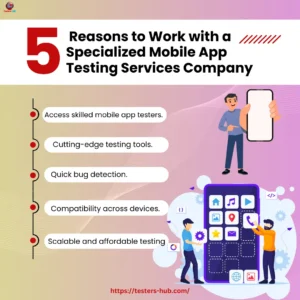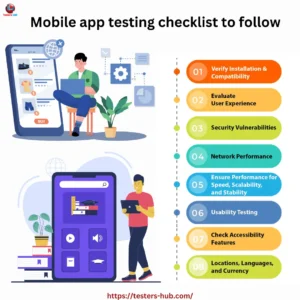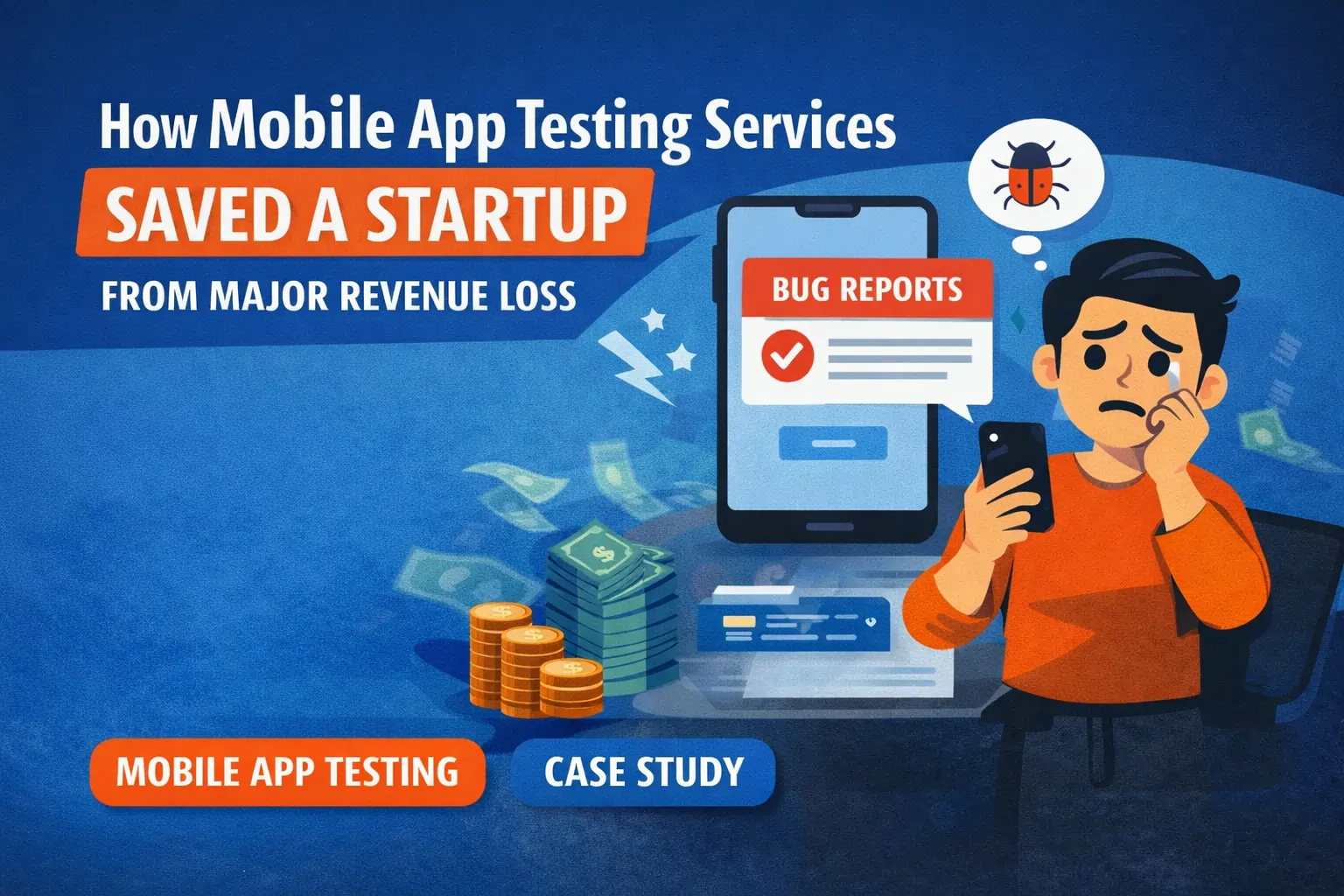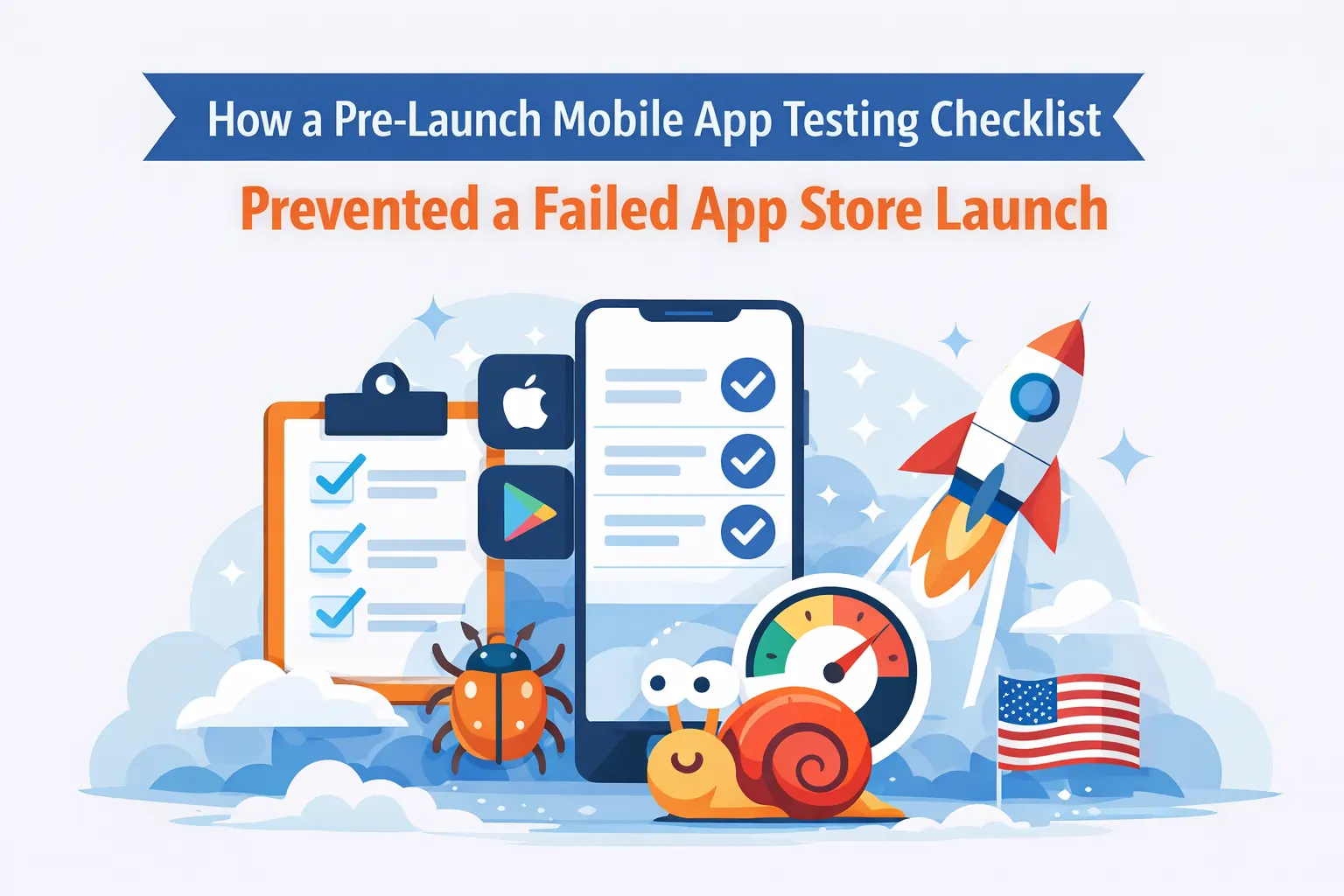How Mobile App Testing Services Help You Stay Ahead in a Competitive Market
In today’s app-centric world, ensuring that mobile applications perform consistently and reliably across various devices and platforms is essential. With countless iOS and Android apps competing for user attention, mobile app testing services are key to providing the seamless, high-quality experiences users expect. Top mobile app testing companies bring specialized expertise and advanced tools to help applications operate smoothly and securely across diverse operating systems and devices.
In this guide, we’ll cover the critical aspects of mobile app testing — including the benefits of automated testing tools, the flexibility of on-demand testing services, and proven best practices in mobile QA. By exploring these strategies, you’ll gain insights into how effective testing can improve user satisfaction, streamline the app development process, and contribute to a successful app launch.
1. Comprehensive Mobile App Testing Services
Why Work with a Specialized Mobile App Testing Services Company?
Comprehensive mobile app testing services cover every aspect of app performance, from functionality and usability to security and performance testing. Choosing a reputable mobile app testing services company is key to achieving high-quality outcomes, as they provide end-to-end support and use specialized tools that streamline the testing process.
Top benefits of partnering with a mobile app testing services company include:
- In-depth reporting on bugs and potential performance issues.
- Access to skilled QA testers with expertise in mobile testing.
- The use of advanced mobile app testing software and frameworks, ensuring tests are conducted efficiently.
Companies can select services tailored to their app’s specific needs, whether focusing on core functionality or performing more niche tests for high-security or high-performance demands.
2. On-Demand Mobile App Testing Services
The Flexibility of On-Demand Mobile App Testing Services
Development cycles today require speed and flexibility, which is where on-demand mobile app testing services come into play. This approach allows developers to initiate tests exactly when they’re needed, which is especially beneficial during high-priority updates or pre-release evaluations.
Key advantages of on-demand testing services include:
- Immediate feedback cycles, allowing teams to identify and address issues without delay.
- Scalability, letting teams adjust the testing volume based on current needs.
- Cost efficiency, as you only pay for the tests you require at any given time.
On-demand mobile app testing is especially helpful for teams using Agile or DevOps methodologies, as it seamlessly integrates into fast-paced development environments. This service ensures that teams maintain quality standards without sacrificing speed.
3. Automated Mobile App Testing for Efficiency and Precision
Benefits of Automated Mobile App Testing
Automated mobile app testing has revolutionized the quality assurance process by minimizing manual effort and accelerating test cycles. It is especially advantageous for recurring tasks such as regression testing and smoke testing, as automated tools can execute these processes with precision and repeatability.
The key benefits of automated testing include:
- Speed: Automated tests can run swiftly without the need for human intervention.
- Consistency: Predefined testing scripts ensure that tests are executed in a consistent manner every time.
- Scalability: Automation allows tests to be run across multiple devices, ensuring broad compatibility.
Popular testing frameworks like Appium, Selenium, and XCUITest (for iOS) are widely used in the industry. Automated testing is particularly beneficial for apps that undergo frequent updates, as it minimizes the risk of human error, supports continuous testing, and provides constant insights into app performance.
4. Using a Mobile App Testing Platform for Device Variety
Choosing the Right Mobile App Testing Platform
A mobile app testing platform is crucial for evaluating how an app performs across a wide range of devices. These platforms offer both real devices and emulators, allowing testing under various conditions to identify potential issues that could arise on different screen sizes, device capabilities, and network environments.
When choosing a mobile app testing platform, here are some key factors to consider:
- Device compatibility across different models of iOS and Android devices.
- Availability of simulators and emulators to facilitate early-stage testing.
- Integration with bug tracking systems to ensure smooth issue resolution.
Well-known mobile app testing platforms, such as BrowserStack and Sauce Labs, offer the ability to test on a broad selection of devices and configurations. These platforms are especially beneficial for companies that do not have access to a comprehensive in-house device collection, ensuring developers can test on the devices most relevant to their target audience.
5. Real-Device Testing for Authentic User Feedback
The Value of Live Mobile App Testing on Real Devices
While simulators and emulators provide a basic testing environment, live mobile app testing on real devices delivers authentic insights into user experiences. Testing on actual hardware helps identify device-specific issues, such as battery drain, memory usage, and processing power limitations.
Benefits of real-device testing include:
- Revealing hardware-specific bugs and performance discrepancies.
- Testing under real-world conditions, such as varied network strengths.
- Enhanced user experience insights, enabling developers to make targeted improvements.
Many top mobile app testing companies offer device labs equipped with an array of real devices, allowing developers to conduct thorough tests without needing to purchase each device independently.
6. Following a Comprehensive Mobile App Testing Checklist
Benefits of a Well-Structured Mobile App Testing Checklist
A mobile app testing checklist is essential for structured QA processes. This checklist covers all aspects of app quality, from initial functionality checks to final user experience evaluations. It ensures that testing is consistent, thorough, and aligned with the app’s goals.
Typical checklist items include:
- Functionality tests to verify that each feature works correctly.
- UI/UX evaluations to assess design and ease of use.
- Load testing to see how the app performs under high traffic.
- Security assessments to identify any vulnerabilities.
A checklist also helps teams maintain testing best practices, such as testing early and often, and helps prevent any aspect of the app from being overlooked.
7. Ensuring Quality with Mobile App Testing and QA
The Role of Mobile App Testing and QA in Ensuring Reliability
Mobile app testing and QA encompass more than just identifying bugs; they ensure the overall quality and reliability of the app. Effective QA practices involve load testing, security testing, and compatibility testing across different devices. High-quality testing and QA prevent user frustration, reduce customer churn, and build trust.
Key QA services include:
- Performance testing to assess speed and reliability.
- Security testing to verify user data protection.
- Compatibility testing for consistent functionality across OS versions.
A dedicated QA team ensures a seamless user experience, helping apps launch successfully and maintain user satisfaction over time.
8. Mobile App Testing Best Practices
Implementing Mobile App Testing Best Practices for Optimal Results
Adhering to mobile app testing best practices significantly enhances the chances of delivering an app that is both dependable and user-friendly. Key practices such as starting testing early, utilizing real devices for accurate feedback, and adopting continuous integration (CI) contribute to the overall success of the app development process. Leading web & mobile app testing companies rely on these best practices to uphold consistent quality across various stages of development.
Key best practices include:
- Early testing to detect and address issues before they become critical.
- Cross-device testing to ensure compatibility across a wide range of devices and operating systems.
- Continuous integration (CI) and continuous deployment (CD) to automate testing throughout the development cycle, promoting faster iterations and early detection of issues.
By following these practices, development teams can maintain a high standard of quality, shorten development timelines, and mitigate the risk of unforeseen issues post-launch.
9. Mobile App Testing Tools for Comprehensive Analysis
Choosing Effective Mobile App Testing Tools
The right mobile app testing tools offer detailed insights into an app’s performance and user experience. Some tools provide crash analytics, while others track user behavior or provide detailed performance metrics. Using a comprehensive toolset is essential to achieving a high-quality, reliable app.
Key mobile app testing tools include:
- Crashlytics for real-time crash reporting and diagnostics.
- Google Analytics for in-depth insights into user behavior and engagement.
- Firebase Test Lab for testing on various device configurations.
These tools allow teams to gather data on issues and make data-driven improvements, supporting a user-friendly and efficient app experience.
10. Leading Mobile App Testing Companies
Benefits of Collaborating with Premier Mobile App Testing Companies like Testers Hub
Working with top-tier mobile app testing companies such as Testers Hub provides access to specialized knowledge and resources required for managing complex app testing processes. These companies offer a comprehensive suite of testing services, from basic functionality checks to in-depth testing for large-scale enterprise applications.
Key advantages of partnering with a trusted testing provider include:
- Expert testers with experience handling diverse and complex testing scenarios across multiple platforms.
- Access to a broad selection of advanced testing tools and device labs for comprehensive cross-device testing.
- Detailed analysis and reports that quickly identify problems and provide insights for swift resolution.
Leading mobile app testing companies have the necessary infrastructure and expertise to address all aspects of testing, ensuring that your app performs optimally, offers a seamless user experience, and is fully prepared for release. Collaborating with a reputable testing company helps you save time, reduce costs, and ensure higher-quality app launches.
11. Performance and Load Testing for Scalability
Why Performance and Load Testing Are Essential for High-Traffic Apps
For apps expected to handle heavy traffic, performance and load testing are essential. These tests evaluate how the app responds to high user demand and help identify potential bottlenecks. Performance testing ensures the app remains responsive and efficient even under stress.
Key aspects of performance testing:
- Load testing to measure how the app performs with concurrent users.
- Stress testing to determine the app’s breaking point.
- Scalability assessments to ensure the app can grow with demand.
Testing for load and performance is critical for apps in sectors like finance, e-commerce, or social media, where user volume can surge unpredictably.
12. Security Testing for Data Protection
Importance of Mobile App Security Testing
Security is a fundamental aspect of mobile app development, especially for apps that handle sensitive or personal data. Security testing is essential to uncover potential vulnerabilities and protect user information from breaches.
Key areas of security testing include:
- Encryption to safeguard data during transmission, ensuring it remains confidential.
- Authentication testing to confirm that only authorized users can access the app and its features.
- Compliance verification to ensure the app meets data protection regulations, such as GDPR.
For sectors like banking, healthcare, and e-commerce, security is particularly critical as users trust these apps with sensitive information. By conducting thorough security testing, developers can minimize the risk of breaches, increase user confidence, and ensure compliance with legal requirements.
Conclusion
Investing in the right mobile app testing services and tools is critical for delivering a high-performing app. From working with a mobile app testing services company to utilizing automated mobile app testing tools and following best practices, each phase of the testing process strengthens the app’s reliability and usability.
Using a mobile app testing checklist ensures comprehensive testing, while real-device testing provides authentic feedback for better user experiences. By understanding and leveraging on-demand mobile app testing services, live mobile app testing, and top mobile app testing companies like Testers Hub, developers can ensure that their iOS and Android apps provide a seamless, engaging, and reliable experience across devices.
In a competitive mobile app market, quality testing and QA practices not only enhance user satisfaction but also ensure that your app stands out among millions, driving better adoption and long-term success.












